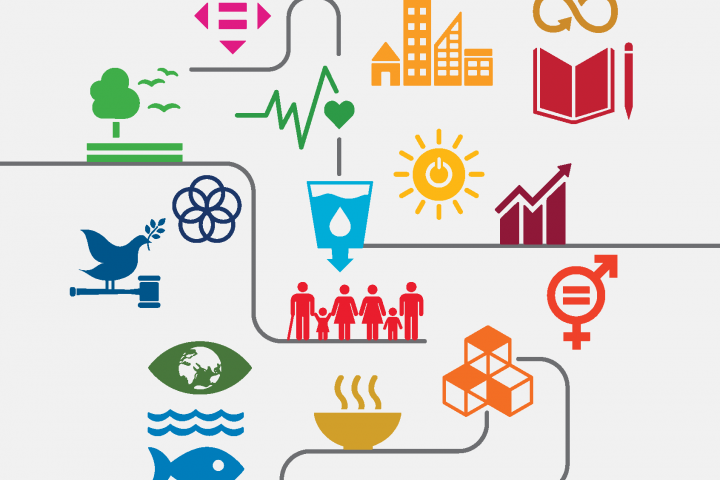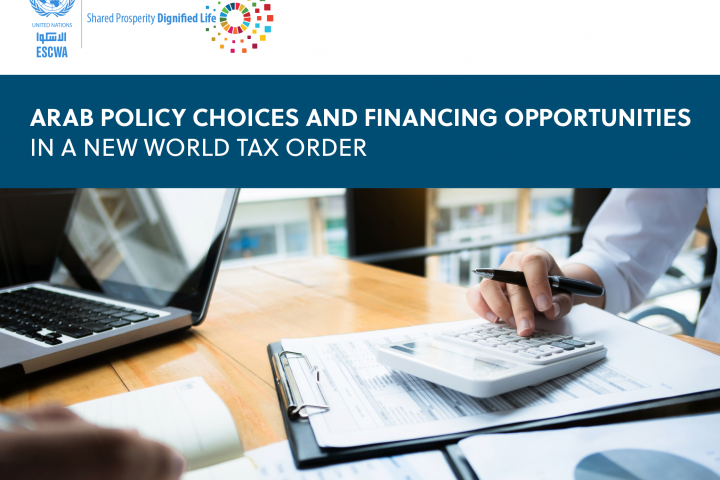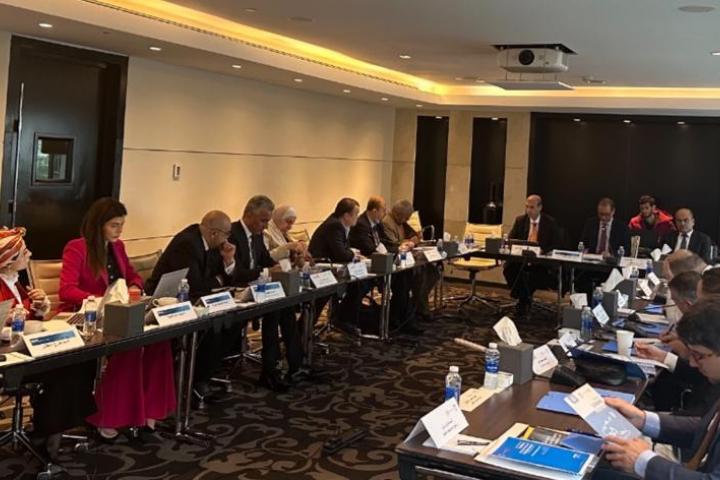ESCWA Report: Enough Resources in Arab region to finance SDG Agenda
Tueni: Difficult to Channel Funds via Lebanese Banking System
Tueni: Difficult to Channel Funds via Lebanese Banking System
Beirut, 05 December 2017 (Communication and Information Unit) – A panel discussion was held at the UN House in Beirut on “domestic resource mobilization by curbing illicit financial flows and trade misinvoicing.” It was attended by the Lebanese State Minister for Combating Corruption, Nicolas Tueni, the General Secretary of the Arab Investors Union, Gamal Bayoumi, the Chairman of the Banking Control Commission, Samir Hammoud, the Union of Arab Banks (UAB) Secretary-General, Wissam Fattouh, and ESCWA Economic Advisor Hisham Taha. Renowned journalist Sabine Oueiss moderated the debate.
The panel brought together high level representatives from ESCWA Member States in addition to international and regional experts on financing for development. The session opened with a speech delivered by ESCWA Deputy Executive Secretary Khawla Mattar on behalf of Executive Secretary Mohamed Ali Al-Hakim.
Tueni
Minister Tueni said illegal financial flows are mainly due to the poor control of the central state over its resources as a result of urgent and pressing political conditions, such as the invasion of Iraq, the division of Palestine, the division of Sudan, and the Yemeni and Syrian conflicts.
According to Tueni, illegal flows in Lebanon are very small because the country applies all financial charters from western countries, financial institutions and Arab institutions, as well as international circulars from the United Nations and international financial systems. […] He reported that it is very difficult to channel funds through the Lebanese banking system, noting that the country is advanced in terms of protecting citizens from illegal flows.
Bayoumi
For his part, Ambassador Bayoumi said the main objective is to combat organized crime and protect against the circulation of money outside the banking sector, which is used in drug trade, terrorism and money laundering. He called for the development of policies, laws and regulations to address these issues.
Hammoud
Hammoud stressed that “there is some overlap between expanding the concept of money laundering and expanding the framework of the use of payment systems. In the previous period, when there were restrictions on transfers throughout the region, restrictions on foreign exchange and the inability of individuals and institutions to engage in free trade and free access to banks, we were proud of bank secrecy.”
“We have adopted bank secrecy to protect large funds which are today called money laundering. If money laundering is part of organized crime as it was in the language of drugs and weapons, its concept today extends to all types of fraud, most importantly terrorism and tax,” he noted.
Hammoud pointed out that the survival of the bank secrecy is no longer useful and its cancellation is harmful. "That's why we adopt it with clean money and lift it off in other cases," he said.
Fattouh
In his intervention, Fattouh said the Arab banking sector plays an important role in combating money laundering and terrorism financing for several reasons, among which is fear of sanctions that may expose any bank in addition to pressure from correspondent banks.
Oueiss
In her introduction, Oueiss said, “discussing this subject allows us to tackle an important issue in the Arab world which is the provision of the required resources to implement the Sustainable Development Goals.”
“The Third International Conference on Financing for Development which was held in Addis Ababa in 2015 succeeded in ensuring the political commitment of world leaders to adopt a plan of action providing the new global framework for financing for development.
However, there is an obstacle that hinders the implementation of the Agenda which is the leakage of financial materials through illegal operations. This poses a practical challenge - perhaps the greatest of all - to Arab sustainable development, and is largely depleted, albeit indirectly, by foreign exchange reserves,” she noted.
[...] “The Arab countries have clearly committed themselves to the Addis Ababa Action Agenda to combat and eliminate these flows by 2030, but the figures of ESCWA studies and reports continue to raise concerns about the progress of this step,” she added.
ESCWA report
Presenting the ESCWA report on the Arab financing for development scorecard, which was issued for the first time in the Arab region, Taha said ESCWA raised the question of the main causes of illegal flows in the Arab region and placed them in four groups: governance, structural motivation, security and stability. Since the onset of instability in the region in 2011, $483 billion have emerged as illegal financial flows, which is equivalent to 3% of global non-oil trade.
According to Taha, the study concluded that for every $1 the Arab region gained in financing, it correspondingly lost $1.05 as illicit financial outflows. He also underlined that for every $1 gained by the Arab region it correspondingly lost $2.9 in direct outflows and continues to finance sustainable development in other regions. Overall, the study found that for each dollar that entered the Arab region, $4 were lost.
Asked whether the report could contribute to countering illegal financial flows and tampering with commercial bills, Taha said: "The purpose of this report was twofold, especially since it was the first ESCWA report on this important subject. First, we wanted to prove that the Arab region has sufficient resources to implement the Addis Ababa Action Agenda and to implement the goals of the 2030 Sustainable Development Goals. Second, we wanted to find out which components are the source of these flows in the Arab region; we discovered that more than 65% of these flows are closely linked to international trade.”
About the 12th Session of the Committee on Financing for Development
The 12th Session of the Committee on Liberalization of Foreign Trade, Economic Globalization and Financing for Development aims to provide an intergovernmental forum for member States to discuss challenges and prospects facing the Arab region with respect to financing for development and the achievement of regional priorities.
ESCWA established the Committee in 1997, taking into account the importance of the participation of member States in the planning, development and monitoring of ESCWA programmes aimed at assisting countries in outlining appropriate national and regional economic development policies. These enable them to take greater advantage of the international trends towards liberalization of foreign trade and economic globalization.
*****
For more information:
Nabil Abu-Dargham +961-70-993144; email: dargham@un.org
Ms Rania Harb: +961-70-008879 harb1@un.org
Ms Mirna Mahfouz: +961-70-827372 mahfouz@un.org
Mr Haidar Fahs : +961-70-079021 haydar.fahs@un.org
The panel brought together high level representatives from ESCWA Member States in addition to international and regional experts on financing for development. The session opened with a speech delivered by ESCWA Deputy Executive Secretary Khawla Mattar on behalf of Executive Secretary Mohamed Ali Al-Hakim.
Tueni
Minister Tueni said illegal financial flows are mainly due to the poor control of the central state over its resources as a result of urgent and pressing political conditions, such as the invasion of Iraq, the division of Palestine, the division of Sudan, and the Yemeni and Syrian conflicts.
According to Tueni, illegal flows in Lebanon are very small because the country applies all financial charters from western countries, financial institutions and Arab institutions, as well as international circulars from the United Nations and international financial systems. […] He reported that it is very difficult to channel funds through the Lebanese banking system, noting that the country is advanced in terms of protecting citizens from illegal flows.
Bayoumi
For his part, Ambassador Bayoumi said the main objective is to combat organized crime and protect against the circulation of money outside the banking sector, which is used in drug trade, terrorism and money laundering. He called for the development of policies, laws and regulations to address these issues.
Hammoud
Hammoud stressed that “there is some overlap between expanding the concept of money laundering and expanding the framework of the use of payment systems. In the previous period, when there were restrictions on transfers throughout the region, restrictions on foreign exchange and the inability of individuals and institutions to engage in free trade and free access to banks, we were proud of bank secrecy.”
“We have adopted bank secrecy to protect large funds which are today called money laundering. If money laundering is part of organized crime as it was in the language of drugs and weapons, its concept today extends to all types of fraud, most importantly terrorism and tax,” he noted.
Hammoud pointed out that the survival of the bank secrecy is no longer useful and its cancellation is harmful. "That's why we adopt it with clean money and lift it off in other cases," he said.
Fattouh
In his intervention, Fattouh said the Arab banking sector plays an important role in combating money laundering and terrorism financing for several reasons, among which is fear of sanctions that may expose any bank in addition to pressure from correspondent banks.
Oueiss
In her introduction, Oueiss said, “discussing this subject allows us to tackle an important issue in the Arab world which is the provision of the required resources to implement the Sustainable Development Goals.”
“The Third International Conference on Financing for Development which was held in Addis Ababa in 2015 succeeded in ensuring the political commitment of world leaders to adopt a plan of action providing the new global framework for financing for development.
However, there is an obstacle that hinders the implementation of the Agenda which is the leakage of financial materials through illegal operations. This poses a practical challenge - perhaps the greatest of all - to Arab sustainable development, and is largely depleted, albeit indirectly, by foreign exchange reserves,” she noted.
[...] “The Arab countries have clearly committed themselves to the Addis Ababa Action Agenda to combat and eliminate these flows by 2030, but the figures of ESCWA studies and reports continue to raise concerns about the progress of this step,” she added.
ESCWA report
Presenting the ESCWA report on the Arab financing for development scorecard, which was issued for the first time in the Arab region, Taha said ESCWA raised the question of the main causes of illegal flows in the Arab region and placed them in four groups: governance, structural motivation, security and stability. Since the onset of instability in the region in 2011, $483 billion have emerged as illegal financial flows, which is equivalent to 3% of global non-oil trade.
According to Taha, the study concluded that for every $1 the Arab region gained in financing, it correspondingly lost $1.05 as illicit financial outflows. He also underlined that for every $1 gained by the Arab region it correspondingly lost $2.9 in direct outflows and continues to finance sustainable development in other regions. Overall, the study found that for each dollar that entered the Arab region, $4 were lost.
Asked whether the report could contribute to countering illegal financial flows and tampering with commercial bills, Taha said: "The purpose of this report was twofold, especially since it was the first ESCWA report on this important subject. First, we wanted to prove that the Arab region has sufficient resources to implement the Addis Ababa Action Agenda and to implement the goals of the 2030 Sustainable Development Goals. Second, we wanted to find out which components are the source of these flows in the Arab region; we discovered that more than 65% of these flows are closely linked to international trade.”
About the 12th Session of the Committee on Financing for Development
The 12th Session of the Committee on Liberalization of Foreign Trade, Economic Globalization and Financing for Development aims to provide an intergovernmental forum for member States to discuss challenges and prospects facing the Arab region with respect to financing for development and the achievement of regional priorities.
ESCWA established the Committee in 1997, taking into account the importance of the participation of member States in the planning, development and monitoring of ESCWA programmes aimed at assisting countries in outlining appropriate national and regional economic development policies. These enable them to take greater advantage of the international trends towards liberalization of foreign trade and economic globalization.
*****
For more information:
Nabil Abu-Dargham +961-70-993144; email: dargham@un.org
Ms Rania Harb: +961-70-008879 harb1@un.org
Ms Mirna Mahfouz: +961-70-827372 mahfouz@un.org
Mr Haidar Fahs : +961-70-079021 haydar.fahs@un.org



